Interfaith
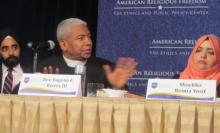
In a conference full of people who champion traditional religious values, Amardeep Singh knew that everyone might not appreciate his recounting of the “uncomfortable” cab ride he had taken the previous day.
Singh, a featured speaker at the second annual National Religious Freedom Conference in Washington on Thursday, told the several hundred attendees that his D.C. taxi driver had the radio tuned to a religiously minded commentator, who was explaining that women become lesbians because they had been abused.
His cab story — both his telling and the reaction to it — reveals fault lines in the coalition of Americans concerned that government and popular culture are eroding religious freedom and trying to banish religion from the public sphere.

In the aftermath of violence, a deep-seated illness of broken minds and spirits, a possibility toward healing always exists. The vicious anti-Semitic attack on a northern New Jersey synagogue exemplifies this possibility. Violence – religious intolerance – was not to have the last word, nor was forgiveness to be blindly shared. A searching for truth was to be engaged. This searching began in the blurring of demarcation lines between different faiths.
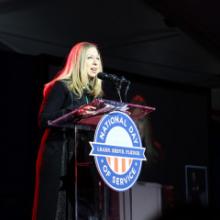
WASHINGTON — Chelsea Clinton is wearing a new professional hat, one that will take her into a religious direction.
The former first daughter is now the co-founder and co-chairwoman of New York University’s Of Many Institute, a program for “multifaith” education. Its website says the institute “supports a new generation of religious and civic leaders who, deeply rooted in their own religious and spiritual traditions, reach across faith boundaries to solve social problems together.”
Clinton’s new job was reported first by the New York Post. There was no press release or big announcement, the newspaper reported — just her bio downloaded onto the program’s website.

THE TERM “DIVERSITY” in professional and educational circles in the United States is frequently mentioned as positive on its face, needing no justification. “Diversity is our strength” or “diversity enriches us” are common statements.
But Harvard professor of comparative religion Diana Eck points out that diversity is simply a demographic fact—a situation in which people with different identities live in close quarters. The term says nothing about how those people get along with one another. Frankly, if all we knew about religious diversity in particular were the stories carried on the international news, it would be hard to conclude anything except that the close gathering of Muslims, Christians, Jews, Buddhists, Hindus, and others is nothing but a recipe for conflict.
Religious conflict is especially deadly because the participants believe they are fighting for cosmic reasons—where death may be welcomed as martyrdom—and religious communities are the largest repositories of social capital in many civil societies, providing endless amounts of energy, people, and resources to mobilize.
But what if the social capital among religious communities could be bridged and people who orient around religion differently could be convinced to cooperate with one another? What if the cosmic narratives of religious traditions viewed people of other faiths as partners in the quest for the kingdom on earth? This is the hope of the interfaith movement, and building this movement is the job of interfaith leaders.
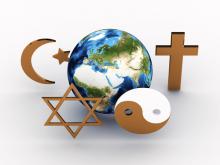
I agree with Rev. Wallis — focusing on the common good is a good step toward answering the question of how to be on God's side, and solving many of our nation's greatest points of division. In a country as diverse as ours, however, it can be challenging to know what the common good actually is. As individual participants in society, we all come to the table with different ideological structures for framing our understanding of what is commonly good. Those structures are often built around religion, philosophy, and our beliefs and understandings about existence, mortality, and the cosmos. The situation is exacerbated by the fact that we live in, arguably, the most religiously diverse nation of all time.
Yes, Jesus has called me to love my neighbor as myself, but what does that really mean when my neighbor is Mormon, Muslim, Jewish, Atheist, secular humanist, or Hindu?
Religion is often blamed for the world's greatest conflicts, and rightfully so. One doesn't have to look far to see conflict or violence that is linked to religious motivations or sentiments in some way (think the tragedy at the Boston Marathon or the Sikh man that was murdered shortly after 9/11 because he was wearing a turban). In a country that becomes more religiously diverse every day, it is easy to allow conflict to arise between different religious and non-religious groups. It is true, difference in religious and philosophical ideology can be a cause of great division. But what if I told you it doesn't have to be that way?
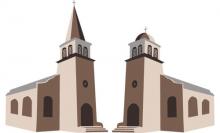
As Americans, we live in a culture that is hyper-individuated, fragmented, and dehumanizing as it pushes a mantra of success based on material accumulation and power. Being in community with others is the countercultural answer to this. Doing so with others unlike ourselves is an important part of this. At the end of the day, above the polarization and partisanship, there is much we can do to promote the common good together. As Maddie put it at a meeting that brought Christians of opposing social interpretations together, "We may never agree on some issues, but that is not why we're here; we're good people, you're good people, let's do good together."
Rose Marie Berger writes in the May 2013 Sojourners magazine cover story, “For God So Loved the World,” that people of faith are key to reversing climate change. It will take a holy power shift to compel God’s people to care for creation and “launch an irresistible force for change.”
In creative and bold ways, people of faith from various religious traditions are doing just that. Together, they are raising their voices and taking action to address climate change.
ANYONE WHO LIVES in Christian community or participates in congregational life knows that it is a holy mess. A group of flawed individuals trying to do "life together" can bring out the worst in one another. But that's precisely where God calls us to be.
In our hyperindividualistic culture, it's often difficult to remember that God has created us to be in community. Christian faith and discipleship, from the beginning, have been shaped not by going at it alone but by engaging in ancient and contemporary communal experiences. The first house churches and the formation of communities among the early desert fathers and mothers, as well as today's megachurches, parachurch organizations, and new monastic groups, all point to how we long to be connected to God and with one another.
Our faith and character are refined by the miraculous gifts of grace, reconciliation, and forgiveness made available to us in community. In such a demanding and disconnected world, it is indeed a miracle when two or more gather to break bread and give of themselves in service to God and one another.
Here are some books to help us along the Way, as we seek to deepen our understanding of what it means to be in communion with Christ and with each other.
In 2009 I was co-leading a new intentional community in Washington, D.C. Our nascent group endured many struggles, including interpersonal issues, conflicting visions and goals, and the involuntary removal of a community member. How I wish The Intentional Christian Community Handbook: For Idealists, Hypocrites, and Wannabe Disciples of Jesus (Paraclete Press), by David Janzen, was available when we first began our journey.

Inmates in British Columbia have filed suit to overturn a decision by the Canadian government to cut part-time prison chaplains, alleging that the policy has nearly eliminated prison ministry to minority faiths.
“Prisoners do not lose their right to freely express their religious and spiritual beliefs by virtue of their incarceration,” said the lawsuit, which asks the court to declare the policy a violation of Canada’s Charter of Rights and to reinstate minority faith chaplains in British Columbia.
The suit was triggered by Ottawa’s announcement last October that it was canceling the contracts of all part-time prison chaplains to save an estimated $1.3 million. The non-Christian chaplains ministered to Muslim, Sikh, Jewish, and Buddhist inmates, and those who follow aboriginal spirituality.
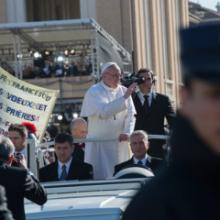
VATICAN CITY — Pope Francis on Friday called for more intense dialogue between religious leaders, particularly Muslims, as he tries to recalibrate relations between the world’s two largest religious groups.
Speaking in the Vatican’s majestic Sala Regia, the Argentine pontiff said that part of his mission is to connect “all people, in such a way that everyone can see in the other not an enemy, not a rival, but a brother or sister.”
In a meeting with Vatican diplomats and foreign leaders, Francis also reaffirmed the church’s commitment to protect the poor and the environment, an early theme in his young pontificate.
“Fighting poverty, both material and spiritual, building peace and constructing bridges: these, as it were, are the reference points for a journey that I want to invite each of the countries here represented to take up,” the pope said.

The president of the Lutheran Church–Missouri Synod apologized for his role in the “debacle” that led him to publicly reprimand a pastor in Newtown, Conn., for praying at an interfaith service following the mass shooting at Sandy Hook Elementary School.
In the initial incident, the denomination’s president, Matthew C. Harrison, requested an apology from the Rev. Rob Morris of Newtown’s Christ the King Lutheran Church for participating in an interfaith prayer vigil that followed the Dec. 14 shootings. Morris’ role in the vigil broke denominational rules against joint worship with other religions.
Morris complied and apologized — not for his participation, but for offending members of the St. Louis-based denomination. But the president’s request sparked a blaze of criticism — from within the denomination and outside it. Critics charged he was intolerant and insensitive to the town’s grieving residents.
“In retrospect, I look back and see that I could’ve done things differently,” Harrison said in a video posted on the denomination’s blog Sunday. “My deepest desire was to bring unity, or at least to avoid greater division in the Synod over this issue.”

A Lutheran pastor in Newtown, Conn., has apologized after being reprimanded for participating in an interfaith vigil following the shooting massacre at Sandy Hook Elementary School.
The Rev. Rob Morris, pastor of Christ the King Lutheran Church, prayed at the vigil the Sunday following the Dec. 14 shootings alongside other Christian, Muslim, Jewish and Baha’i clergy.
Morris’ church is a member of the Lutheran Church–Missouri Synod, and the denomination’s constitution prohibits ministers from participating in services with members of different faiths.
It’s not the first time a Missouri Synod pastor has been reprimanded for joining an interfaith prayer service; a New York pastor also was suspended for participating in an interfaith service after the 9/11 terrorist attacks.
LCMS president Matthew Harrison wrote in a letter to the Synod that “the presence of prayers and religious readings” made the Newtown vigil joint worship, and therefore off-limits to Missouri Synod ministers. Harrison said Morris’ participation also offended members of the denomination.

IT'S A STORY that promises to make you believe in God.
A boy, shipwrecked on a lifeboat with a Bengal tiger, repeatedly cheats death and eventually discovers his own self. It's a typical coming-of-age tale, really—except for the whole tiger part.
Life of Pi centers on Pi Patel, the son of a zookeeper, who grows up grasping to understand God. His open heart and willingness to learn lead him from Hinduism to Christianity to Islam. While stranded at sea along with a few escaped zoo animals as company, he continues to explore the meaning of God as he's thrust into dramatic—and at times inconceivable—situations.
Anyone who has read Yann Martel's best-selling book can understand how near impossible it seems to adapt the larger-than-life story into a film—none more so than the person who did just that, screenwriter David Magee. The largest chunk of Pi's journey is a solitary one, save the aforementioned Bengal tiger (named Richard Parker).
In an interview with Sojourners, Magee said he wrote the scenes without any lines for Pi at all, only inserting them where necessary after the fact.

PERHAPS NO FRAMEWORK has impacted my organization, Interfaith Youth Core, more than Marshall Ganz’s approach to public narrative (“leadership storytelling”), best articulated in his March 2009 Sojourners article “Why Stories Matter.” We use it in our trainings with college student interfaith leaders and recommend it in the workshops we do with university faculty. Most famously, it was employed by the 2008 Obama campaign.
Like all effective frameworks, there is both a visceral and a heady quality to what Ganz teaches. Stories are the way human beings understand and communicate our deepest values, Ganz says, and there are three major stories that leaders must tell. The first is the story of self. This is not a selfish activity, or even one just about self-understanding (although that is certainly a piece of it). It’s about interpreting to others your reasons for being engaged in a struggle. This helps them understand your involvement and, more important, gives them inspiration and language to get active themselves.
The second type of story is the story of us. Religions, races, ethnicities, and nations tell such stories brilliantly but often do it in a way that excludes—and makes enemies of—those outside the magic circle. The challenge for the 21st century leader is to tell a story of us that includes people of all backgrounds who are fighting for the same cause. Stories of us build community out of people who would otherwise be strangers.
The 113th Congress is the most diverse in U.S. history. New members include the first Hindu, first Buddhist, and the first "none." The Washington Post reports:
The new, 113th Congress includes the first Buddhist to serve in the Senate, the first Hindu to serve in either chamber and the first member of Congress to describe her religion as “none,” continuing a gradual increase in religious diversity that mirrors trends in the country as a whole. While Congress remains majority Protestant, the institution is far less so today than it was 50 years ago, when nearly three-quarters of the members belonged to Protestant denominations.
Read more here.

Presidents, government ministers and religious leaders from around the world gathered in Vienna on Monday Nov. 26 for the gala launch of the King Abdullah Center for Interreligious and Intercultural Dialogue.
While Austria and Spain joined Saudi Arabia in establishing the center, it originated in a bold initiative by Saudi King Abdullah. Some years ago, the king convened representatives from all segments of the Muslim world in Mecca to support his call for Islam to engage the other world religions in addressing the social, scientific, and global challenges of our times.
He followed this up with an interfaith conference in Madrid co-hosted with King Juan Carlos of Spain and subsequently brought his initiative to the United Nations in 2008, hosting a gathering of world political leaders that included Israeli President Shimon Peres.
Christianity Today reports:
As violence flares anew between Hamas and Israel, which is preparing for a ground invasion of Gaza in response to Hamas rocket attacks reaching as far as Tel Aviv, CT checked in with Jerusalem-based reconciliation ministry Musalaha for an update on reconciliation efforts between Palestinian Christians and Messianic Jews.
In 2009, CT reported how three weeks of Israel-Hamas fighting—which killed 1,400 Palestinians and 13 Israelis—left Gaza's beleaguered Christians beginning 2009 in their worst situation since the 1967 Arab-Israeli War. However, reconciliation work between Palestinian Christians and Messianic Jews continued.
Read more here.
EARLIER THIS year, the Interfaith Partnership of metropolitan St. Louis held a public panel presentation addressing three Abrahamic religions—Judaism, Christianity, and Islam—on war and peace. Members of Interfaith Partnership and interested people from the community filled the chapel at Eden Theological Seminary to hear a Jewish scholar, a Muslim academic, and a Christian theologian (me) offer brief presentations on how our respective faith traditions value peace, as well as why, when, and how each religion views the use of violent force as sometimes morally justified.
During the question-and-answer period, I highlighted how in recent years both nonviolent and just war Christians have worked together on an approach, known as just peacemaking, for dealing with the underlying causes of war and thereby preventing its outbreak. As is often the case when I talk on this topic, most persons in the audience seemed unfamiliar with just peacemaking. After I attempted to clarify it further, someone asked the panel if other religious traditions had anything comparable to just peacemaking. The answer is yes, at least for Judaism and Islam, as shown in Interfaith Just Peacemaking, edited by Susan Brooks Thistlethwaite, a theologian and ordained minister in the United Church of Christ.
The 10 proactive practices that have been empirically proven as realistic and effective ways for preventing many wars form the framework for Interfaith Just Peacemaking. They were first identified in Just Peacemaking: The New Paradigm for the Ethics of Peace and War, edited by theological ethicist Glen H. Stassen. That book’s 23 contributors (scholars and practitioners from multiple disciplines—theology, political science, psychology, and history—and from pacifist and just-war perspectives) shared concerns about how just war has devoted insufficient attention to dealing with catalysts that lead to conflict (and not making war truly a last resort) and about how pacifism has failed to offer clear guidance about practical alternatives to war.
A possibly significant development in Muslim-Christian-Jewish relations is being spear-headed by the Islamic Scholars of North America (ISNA). In July of 2012, ISNA Director of Community Outreach, Dr. Mohamed Elsanousi, convened a small multilateral forum of scholars in Mauritania to discuss challenges faced by religious minorities in Muslim-majority communities around the world.
Mauritania is an interesting choice, since it has no indigenous Christian population, and the CIA World Factbook lists the country as “(official) 100% Muslim.”
So, officially, Mauritania is 100 percent Muslim, which begs the question: If the ISNA is reaching out to Islamic scholars in Mauritania on the issue of minority religious rights, and the (official) statistic is that Mauritania is 100 percent Muslim, is this a tacit recognition on ISNA’s part that some of the 100 percent officially Muslim Mauritanians have secretly switched their religion … and that international human rights standards should allow them to do so?
If that’s the case, then this is a significant development in interfaith relations.
… the key word being if.
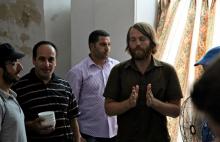
Hebron is known as one of the most volatile cities in the whole region of Israel/Palestine. Located in the heart of the West Bank, both Jews and Arabs have had roots here for thousands of years. Having endured years of conflict, racism, violence and separation, Hebron’s inhabitants have been covered in a narrative lacking an acknowledgment of a shared humanity.
It’s in the middle of such realities that our Learning Community (part of our organization, The Global Immersion Project) feels called to listen, learn, and be radically present. Through the art of friendship making, shared tables and storytelling, we desire to promote the just heart of God by being a people of reconciliation in the way of Jesus.
It was this posture that landed us in the underground home of a local Muslim Palestinian family who is close friends with the Jewish Rabbi who was hosting us in the old city of Hebron (he is both a host and dear friend). Having prepared a beautiful and expansive Palestinian meal, they warmly invited each one of us into their home and said, “Today, this is your home.”